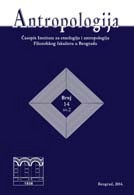СОЦИО-КУЛТУРНИ И ИСТОРИЈСКО-ПОЛИТИЧКИ ЧИНИОЦИ НАСТАНКА УЈЕДИЊЕНЕ ЕВРОПЕ ПОСЛЕ II СВЕТСКОГ РАТА - КА АНТРОПОЛОШКОЈ АНАЛИЗИ
SOCIO-CULTURAL, HISTORICAL AND POLITICAL FACTORS FOR THE UNITED EUROPE FORMATION AFTER THE SECOND WORLD WAR-TOWARD AN ANTHROPOLOGICAL ANALYSIS
Author(s): Marija KrstićSubject(s): Cultural Anthropology / Ethnology, EU-Approach / EU-Accession / EU-Development, Politics and Identity
Published by: Институт за етнологију и антропологију
Keywords: European Union; European cultural identity; unity in diversity;
Summary/Abstract: In this paper I made a review of fundamental historical, political, economical and cultural influences which preceded and influenced (and still influence) Euro-integration and directed the process of Europeanisation. Within this framework, I discussed several key issues: the construction of Europe, European cultural identity, "unity in diversity" politics, and relevant European declarations, such as "Document on the European Identity" signed in Copenhagen and "The Treaty of the European Union" from Maastricht. Therefore, I paralleled scholars’ interepretations of the EU, European concepts on culture, identity and civilisation with the EU official attitude engendered in mentioned documents in order to show the EU-integration as a "continent building process". In this respect, the paper represents a starting point for an anthropological critical reflection on European unity after the 2nd World War.
Journal: Antropologija
- Issue Year: 11/2011
- Issue No: 3
- Page Range: 51-73
- Page Count: 23
- Language: Serbian

